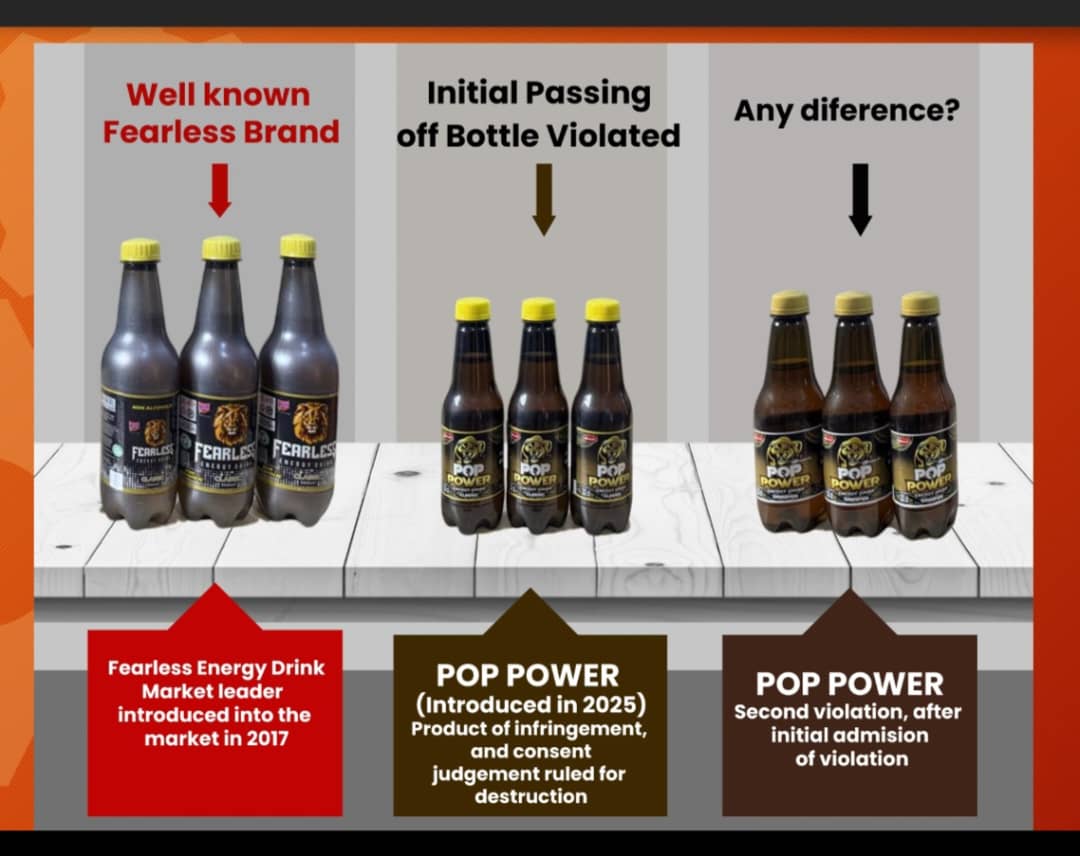Rite Foods’ recent court charges against Memuda Beverages, a Kano-based regional player, over Trademark Infringement of Fearless Energy Drink by a product named Pop Energy Drink bring to the fore a marketing virus begging for a cure.
Contrary to the pre-industrial societies where land functioned as the source of virtually all wealth, the advent of the industrial revolution necessitated individuals and institutions to take substantial risks by financing new inventions, machinery, and business enterprises.
Today, techpreneurs, entrepreneurs, bankers, intellectual property (IP) creators and owners, industrialists, and other holders of large sums of money have replaced landowners as the most powerful economic force.
To protect this new economic force, existing laws were recalibrated and new laws were made to ensure that people who invested their funds in the hope of realising greater profits and thereby becoming business owners of property and business firms were neither disappointed nor defrauded.
Read Also: WPP renews global marketing partnership with Coca-Cola
In Nigeria, one of such laws is the Nigerian Trademark Law, which primary purpose is to protect business reputation, goodwill, and deception. However, the presence of this law has done so little or nothing to protect brands and businesses from intellectual property thieves who have been robbing owners of trademark of their legitimate gains.
In basic legal language, logos, names, or a combination of both are used to create a new design commonly known as trademarks, which signify a product’s originality (tangible or intangible). Put simply, a trademark is the right of a manufacturer to identify their product and make it secure so that no one can use the same logo or name to sell their product without the permission of the original owner.
Early this year, Rite Foods Limited, the manufacturer of Fearless, an energy drink brand, pressed charges against Memuda Beverages Limited for infringement of its trademark and design in the Fearless energy drink product. Memuda had introduced Pop Power, a new energy drink accused of passing off on Rite Food’s Fearless.
Rite Foods obtained injunctive orders of court including Anton Pillar injunctions for the seizure of the Pop Power products. However, Memuda proposed settlement terms for the resolution of the suit and agreed to destroy the seized products as part of the conditions for the discontinuance of the suit by Rite Foods. Mamuda also undertook not to make any products in the future to infringe on the trademark and design of Rite Foods in its Fearless brands.
Surprisingly, barely a month after the parties had settled in court, Memuda reportedly introduced what it claims to be a different design for its Pop Power product which does not infringe on Rite Food’s trademark and design rights in its Fearless brand. Meanwhile, Rite Foods is claiming before the court this time, that the second design of Memuda’s Pop Power still passes off on Fearless energy drink in continuous violation of its trademark and design. The suit follows a long line of allegations against Memuda’s deliberate intention to pass off its products as that of other well-established products in the market
Memuda Beverages Response
In a somewhat disingenuous response, Memuda Beverages, through paid posts in some national publications, claimed it had complied with the court’s initial consent judgment, which directed it to desist from further passing off Fearless Energy Drink and infringing on the trademark of the popular product. The company claimed that Rite Foods Limited’s fresh matter in court is tantamount to corporate bullying. Analysts believe this argument from Memuda Beverages is not only weak but an inadvertent admittance of wrongdoing that appears to say that since it has slightly adjusted the initial trademark (which Rite Foods is contesting), a repeat of the violation should be ignored. According to Mr Johnson Ajeh, a marketing communication expert, what Memuda Beverages has done after pretending to have implemented and obeyed the initial consent judgement is like repeating the same action for which it has initially admitted wrongdoing. The identity confusion that is being avoided by Rite Foods Limited will persist if the authority fails to do what is needed. Consumers will be the most affected if and when they can’t clearly distinguish between the two products. That should never be the case.
Whichever way the pendulum of the suit swings, trademark infringement always leaves the original brand owner at a loss, and it also raises some serious questions regarding the credibility of the product passing off on the original.
In as much as counterfeit goods and unauthorised use of trademarks are often driven by a lack of awareness of the Intellectual Property Laws and sometimes economic incentives like cheaper options,
trademark infringement can causes a great loss of revenue, damage to brand reputation, and erosion of consumer trust to the original owner. High litigation costs can equally put the trademark owner at a great loss.
Trademark infringement and counterfeit products are not limited to Nigeria and Africa alone. The United States Trademark Report (USTR) 2024, highlighted the issue of trademark infringement in countries like India, China, Russia, and Venezuela, counting up to a total of seven countries in serious violation of Intellectual property rights. These countries are still placed under a “priority watch list”.
Watch MARKETING EDGE ONTV
Calling for adequate and effective enforcement against trademark counterfeiting, which plays a key role in reducing the potential health and safety risks, the report stated that counterfeit products, including counterfeit medicines, can pose harms to the citizens of the trading partners where those counterfeit products are consumed.
In developing countries like Nigeria, trademark infringement is prevalent, and duplicate or deceptive products are seen and sold in the open market in the name of the original without restriction from the authorities.
To curb the challenges of trademark infringement in Nigeria, mechanisms of enforcement must be put in place to deter would-be offenders (infringers) who attack the fortress of trademark protection in the country with impunity.
In conclusion, the need for a more-involving and stringent trademark law will definitely go a long way to save the creative and IP sector of the economy.






Comment
No comments found.